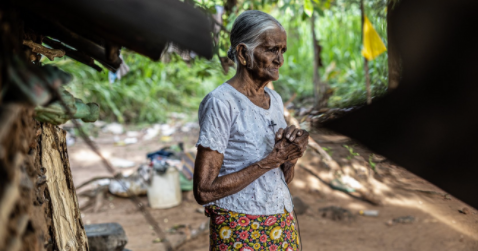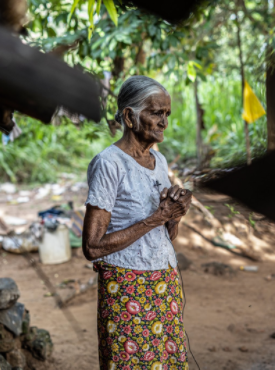2021 Sep 1
“There was this aththamma that we met a couple of years back, in Narammala. She was selling floor mats by the side of the road. I was having a chat with her. She was saying that her son, who is unmarried, comes home and assaults her every day asking for money.”
Despite the cultural norm, where we are taught by our parents and in schools from a very young age to respect and treat our elders well, the ageing population in our country faces verbal, physical, mental and emotional abuse and assault daily. Taking place predominantly in suburban and rural areas of the country, more often than not, elderly parents are abused by their own children and family members.
With hopes of understanding more about how elders are treated in our country and what we can do to help improve the situation, we spoke to Manjith Thananegama, the founder of Kind Hearted Lankans, a non-profit organisation dedicated to helping the underprivileged and children in Sri Lanka lead better lives. And this is what we found out.
The Cruiciality of the Situation
“I have a spinal disease, and one of my legs is broken too. I was begging for food from people, but I cannot walk anymore. I was once a hard-working person with many dreams, but look what has happened to me today. I don’t even have anyone to make me a cup of tea.”
Malkanthi was ill and living alone when the team from Kind Hearted Lankans found her. She was once a very self-reliant lady who used to work overseas, but she was diagnosed with a serious spinal cord condition and heart complications. Her children stopped supporting her as soon as she fell ill and asked her to leave. Despite many difficulties, she built a small shack for herself – this is where she stays. On most days, she doesn’t even have 3 meals to eat. She is currently receiving numerous medications for her illnesses.
When the team from Kind Hearted Lankans met him, Norman seeya was homeless and was sleeping on the side of the road. He had no place to stay. His children had asked him to leave the house, claiming that he is a burden to other family members.
“There was this aththamma that we met a couple of years back, in Narammala. She was selling floor mats by the side of the road. I was having a chat with her. She was saying that her son, who is unmarried, comes home and assaults her every day asking for money.”
Speaking to the team at Kind Hearted Lankans, this old lady revealed that she sells each floor mat for around LKR 80. On some days, she would manage to earn around LKR 500. She was homeless, despite having worked hard her entire life to raise four children. When the team met her son, he deflected their questions and denied that he treats his mother that way. However, when inquired from their neighbours, they confirmed that he assaults her all the time, and that it’s something very normal.
These are just three stories, out of thousands. What’s more heartbreaking is that most of these elders who are being ill-treated and abandoned rarely open up about what they are experiencing and rarely talk about their children in a negative manner, despite all the hardships they endure.
Manjith revealed that in many of the villages that they have visited, they have also seen families of 6 or 7 members with bare minimum resources living peacefully and happily together. He went on to say that most of the conflicts within families that lead to mistreatment of elders are born from addiction to drugs and alcohol.
Moreover, these elders in villages only have the nearest police station as an authoritative body to report to. However, more often than not, once their children become aware that their parents have lodged a complaint against them, these innocent elders are subjected to more harassment and neglect as revenge.
Lack of Support from Governing Authorities
“In Sri Lanka, there are two main departments that support elders. One is the Department of Social Services, and the other is the National Secretariat for Elders. The Department of Social Services mainly focuses on people with disabilities. Under the Department of Social Services, there is an office in each district. However, they don’t have sufficient funds. Under the National Secretariat for Elders, there are about 349 registered elders’ homes. In Colombo, there are only 4 registered government-run homes. There are about 36 that are run by private organisations. We always meet homeless elders on the street, but we can never put them into a government home because they are always full.”
Manjith spoke to us about the lack of government support received when trying to help homeless elders in the country. In his experience, more often than not, the funds that are allocated to these government registered homes actually go into the development of these elders’ homes. Further, there is no proper system in place to monitor these homes.
He spoke to us about how the Kind Hearted Lankans team has to seek the support of private organisations, due to the lack of supportiveness of government-run elders’ homes in admitting homeless elders. Another issue is that the government-run elders’ homes and government authorities are not transparent enough when it comes to how the monetary donations are utilised for the upliftment of these elders’ homes.
Elders’ Homes You Could Consider Helping
The following elders’ homes were recommended by the Kind Hearted Lankans team, as they have worked with these private elders’ homes before:
- Salina Alwis Elders Home, Piliyandala: 0112 615 469
- Aloka Elders Home, Panadura: 0382 239 400
We at Pulse spoke to representatives from the above homes and found out that due to the outbreak of the Coronavirus, they have been facing many challenges and difficulties. With sudden lockdowns and travel restrictions, their regular volunteers are not able to visit and donate food and other day-to-day supplies. Further, they have been facing hardships with taking care of sick elders, as it is a huge risk to take them to the hospital. They have to take many safety measures to ensure that these elders don’t contract the virus and in turn, infect other elders residing in the home.
As for supplies, they are in need of dry rations, medicinal items like Panadol, Piriton, Paspanguwa, Samahan and Vitamins, and other daily necessities like soap, toothpaste, washing powder and kitchen items. They are currently not allowing any outsiders to volunteer in taking care of the elders, but they have kept a table outside for anyone to come and drop off dry rations and other daily household items. Monetary donations are also very important to them.
The below website also includes a list of government registered organisations that are taking care of elders in Sri Lanka, for anyone who is willing and able to donate. However, please note that the website is not updated regularly, and if you are donating, do make sure to ask for updates with proof on how the donation was utilised. We also urge charitable contributors to seek for organisations that are transparent with the work that they do and carry out their work diligently and with integrity.
http://www.ird.gov.lk/en/publications/SitePages/Approved%20Charity.aspx?menuid=1408
Other Ways You Can Help and Support
Seeing that these difficult times have caused a lot of monetary problems among most of us, if you are unable to donate, fret not. There are still ways that you can help improve the lives of these elders.
Awareness is key, as not many people know about the hardships that most people in rural areas face and the amount of abuse and trauma they undergo, inflicted by their own loved ones. You could help spread awareness and be actively involved in improving this situation. It is fundamental to understand the root causes of how these ill-treatments manifest and the environmental factors that contribute to such conduct. This helps to prevent instances of ill-treatment from becoming systemic.
Any small act of kindness will never go unnoticed. Spending a day at an elders’ home (once the Coronavirus situation ceases), taking care of them and engaging in conversations with them are enough to brighten their day. Elders who are mistreated and/or removed from their family members can feel extremely isolated, which can impact their psychological and social well-being, in turn compromising their physical well-being. Hence, making them feel like they are not alone by interacting with them will always be appreciated.
If you have personally donated to any elders’ homes that are in dire need of help, please comment below and let us all know, so we can work together as a community in taking care of our elders.











